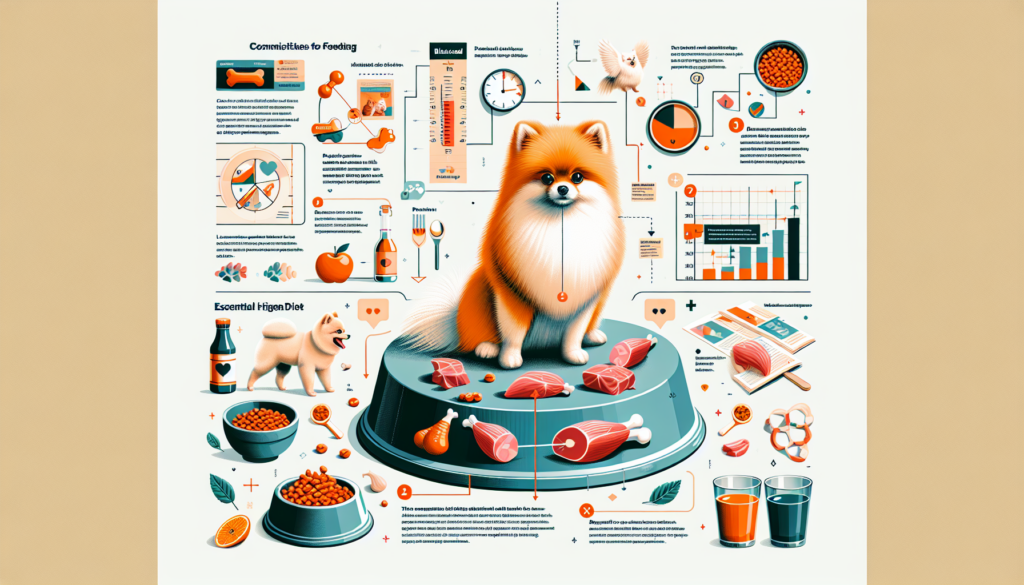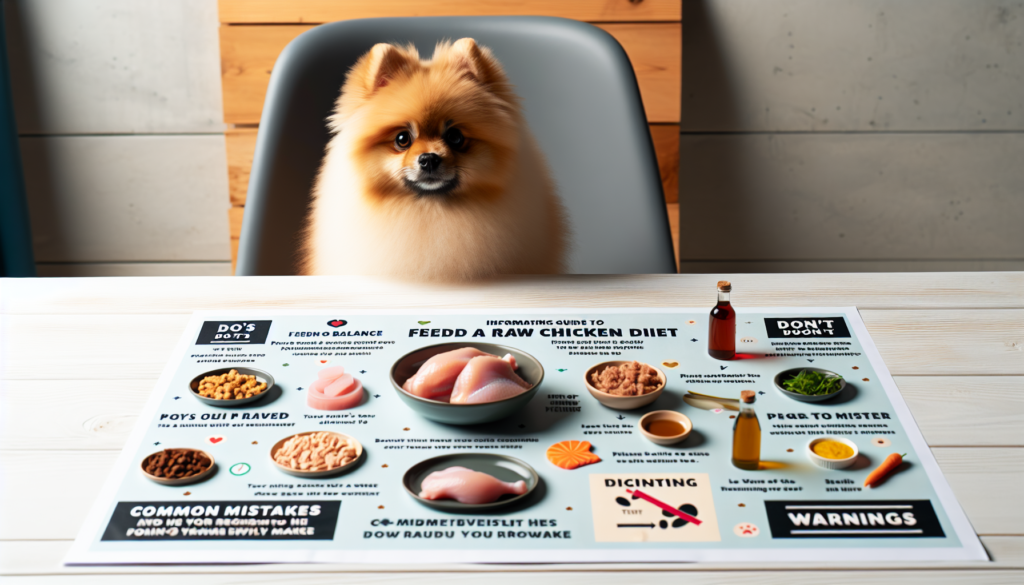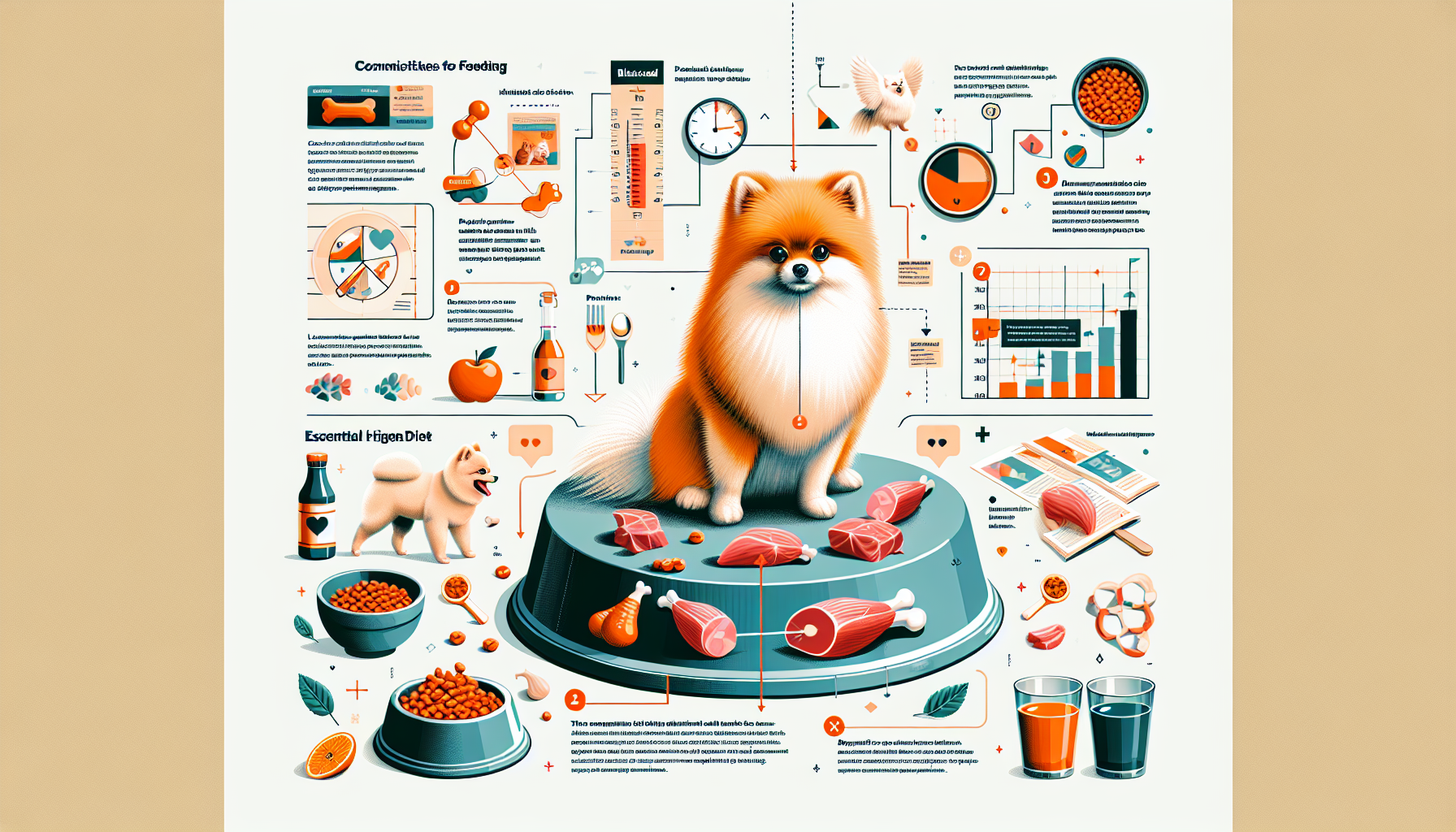If you have a Pomeranian as a furry companion, it’s important to know the do’s and don’ts of feeding your little ball of fur raw chicken. While raw chicken can provide nutritional benefits for your Pomeranian, there are certain precautions you should take to ensure their safety and well-being. In this article, we’ll explore the ins and outs of feeding raw chicken to your Pomeranian, including the potential risks, proper preparation methods, and helpful tips to keep in mind. So, let’s jump right in and learn how to navigate the world of feeding raw chicken to your Pomeranian!

The Do’s and Don’ts of Feeding Your Pomeranian Raw Chicken
Feeding your Pomeranian a raw chicken diet can have numerous health benefits, but it’s important to follow the do’s and don’ts to ensure their safety and well-being. Here are some guidelines to keep in mind when incorporating raw chicken into your Pomeranian’s diet.
Do: Ensure the Chicken is Fresh and High-Quality
When feeding your Pomeranian raw chicken, it’s crucial to choose fresh and high-quality poultry. Fresh chicken minimizes the risk of bacteria and contamination, which can be detrimental to your dog’s health. Opt for chicken that is still within its expiration date and is stored under proper refrigeration.
Choosing Fresh Chicken
When selecting fresh chicken for your Pomeranian, pay attention to the appearance and smell. Look for chicken that has pink or white flesh with no signs of discoloration or sliminess. The chicken should also have a mild, fresh scent. If the chicken smells off or has a strong odor, it is best to discard it and find a fresher option.
Opting for Human-Grade Chicken
To ensure the highest quality, it is recommended to choose human-grade chicken for your Pomeranian. Human-grade chicken is intended for human consumption and undergoes stricter regulations and inspections compared to pet-grade chicken. This reduces the risk of contaminants and ensures a healthier meal for your furry friend.
Avoiding Frozen, Processed, or Outdated Chicken
While fresh chicken is ideal, avoid feeding your Pomeranian frozen or processed chicken. Freezing and processing can alter the nutritional value of the meat and may introduce unwanted additives or preservatives. Additionally, do not feed your Pomeranian chicken that has passed its expiration date, as it can pose health risks.
Do: Thoroughly Wash the Chicken Before Feeding
Before serving the raw chicken to your Pomeranian, it is essential to wash it thoroughly. This step helps remove any surface bacteria or contaminants that may be present on the chicken.
Importance of Washing
Washing the chicken helps to reduce the risk of bacterial infections such as Salmonella or Campylobacter. These bacteria can be harmful to both dogs and humans. By washing the chicken, you minimize the chances of these bacteria causing illness in your Pomeranian.
Proper Washing Technique
To wash the chicken, place it under running water and rub it gently with your hands. Make sure to clean all areas, including crevices, cavities, and hidden pockets. Take care not to splash water, as it can spread bacteria around your kitchen. Remember to wash your hands and any utensils or surfaces that come into contact with the raw chicken to prevent cross-contamination.
Removing Excess Moisture
After washing the chicken, pat it dry with paper towels to remove excess moisture. The excess moisture can encourage bacterial growth during storage or feeding, so it’s important to remove as much as possible. Dry chicken also helps to prevent mess and reduces the risk of slipping or dropping while handling.
Do: Remove Bones and Giblets
Feeding raw chicken bones and giblets to your Pomeranian can be hazardous to their health. It is crucial to remove these parts before feeding to ensure the safety of your dog.
Potential Hazards of Bones
Raw chicken bones can splinter and cause choking hazards, internal injuries, or blockages if ingested by your Pomeranian. These bones can break into sharp fragments that can damage your dog’s gastrointestinal tract. It is best to err on the side of caution and avoid feeding any bones to your Pomeranian.
Risks Associated with Giblets
Giblets, such as the liver, heart, and gizzard, can contain a high concentration of vitamins and minerals. While these organ meats can be beneficial in moderation, it is crucial to ensure the sources are safe and free from any potential toxins. Consult with your veterinarian to determine if and how you should incorporate giblets into your dog’s diet.
Safe Alternatives to Bones
If you’d like to provide your Pomeranian with a raw meaty bone experience, consider offering safe alternatives such as raw recreational bones specifically designed for dogs. These bones are larger and have less risk of splintering. Supervision is still essential to prevent any potential accidents or injuries.

Do: Cut the Chicken into Appropriate Sizes
When preparing raw chicken for your Pomeranian, it is important to cut it into appropriate sizes. This ensures your dog can consume the chicken safely and reduces the risk of choking or swallowing issues.
Importance of Size
Cutting the chicken into appropriate sizes helps prevent your Pomeranian from attempting to swallow large chunks whole. Smaller portions are easier to chew and digest, minimizing any potential discomfort or blockages.
Recommended Chicken Portion Sizes for Pomeranians
The recommended chicken portion size for Pomeranians will vary depending on their age, weight, and activity level. As a general guideline, it is recommended to offer chicken portions that are around the size of your Pomeranian’s mouth. This allows them to chew and enjoy their meal without any difficulties.
Avoiding Choking or Swallowing Issues
Always monitor your Pomeranian while they are eating to ensure they are chewing their food properly and not experiencing any difficulties. If you notice any signs of choking, gagging, or struggling to swallow, intervene immediately to prevent any potential accidents or injuries.
Do: Gradually Introduce Raw Chicken into Your Pomeranian’s Diet
When transitioning your Pomeranian to a raw chicken diet, it is important to do so gradually. Abrupt dietary changes can cause gastrointestinal upset and discomfort. Slowly introducing raw chicken allows your dog’s digestive system to adapt and prevents any adverse reactions.
Benefits of Gradual Transition
Gradually introducing raw chicken into your Pomeranian’s diet gives their body time to adjust to the new protein source. It helps prevent digestive issues such as diarrhea, vomiting, or constipation that may occur when switching to a different diet suddenly.
Understanding Pomeranians’ Sensitivity to Dietary Changes
Pomeranians can be sensitive to changes in their diet, which is why a gradual transition is crucial. Sudden shifts in their food can lead to stress, GI upset, and potential nutrient imbalances. By taking it slow, you can minimize any digestive disturbances and ensure a smooth transition.
Transitioning Techniques
To transition your Pomeranian to a raw chicken diet, start by mixing a small amount of raw chicken with their current food. Gradually increase the amount of chicken while reducing the old food over a span of several days or weeks. Monitor your Pomeranian’s response and adjust the transition pace accordingly. If you notice any digestive issues, slow down the process or consult with your veterinarian.
Do: Monitor Your Pomeranian’s Health and Stool
As you introduce raw chicken into your Pomeranian’s diet, it’s important to monitor their health and stool regularly. This allows you to promptly identify any potential issues or allergic reactions.
Observing for Allergic Reactions
While relatively rare, a Pomeranian may have an allergy or sensitivity to certain proteins found in chicken. Keep an eye out for signs of allergies such as itching, redness, swelling, or digestive disturbances. If you notice any of these symptoms, discontinue feeding chicken and consult with your veterinarian.
Checking for Digestive Issues
Raw chicken may affect your Pomeranian’s digestive system, especially during the transition period. Monitor their stool for any changes in frequency, consistency, or color. Loose stools or diarrhea could indicate a need for adjusting portion sizes or transitioning at a slower pace.
Signs of Potential Problems
Alongside monitoring their health and stool, pay attention to your Pomeranian’s overall demeanor, energy levels, and coat condition. If you notice any significant changes such as lethargy, excessive shedding, or dull coat, it’s important to seek veterinary advice promptly.
Do: Seek Veterinary Advice
Consulting with a veterinarian is crucial when it comes to feeding your Pomeranian raw chicken. They can provide personalized advice, address any concerns, and ensure your dog’s specific needs are met.
Importance of Consulting a Veterinarian
Each Pomeranian is unique, and their dietary needs may vary based on various factors such as age, weight, health conditions, and individual preferences. A veterinarian can assess your Pomeranian’s overall health and provide professional guidance tailored to their specific requirements.
Customizing Diet According to Pomeranian’s Specific Needs
A veterinarian can help you customize your Pomeranian’s raw chicken diet based on their nutritional needs. They can recommend specific chicken portions, other essential nutrients to include, and guide you on maintaining balanced nutrition for your furry companion.
Monitoring Overall Health
Regular veterinary check-ups are essential to monitor your Pomeranian’s overall health and well-being. Establishing a relationship with a trusted veterinarian allows for ongoing support, advice, and monitoring to ensure your Pomeranian remains healthy and thriving on their raw diet.
Don’t: Feed Raw Chicken with Seasonings or Spices
While many of us enjoy flavoring our meals with seasonings and spices, it’s best to avoid adding these to the raw chicken you feed your Pomeranian. Seasonings and spices can have negative effects on your dog’s health and may pose various risks.
Risks of Seasonings and Spices
Seasonings and spices commonly used in human cooking often contain ingredients that can be toxic or irritating to dogs. Ingredients such as garlic, onion, salt, or excessive herbs can lead to digestive upset, anemia, or even organ damage in dogs. It’s always best to keep your Pomeranian’s meals plain and simple.
Negative Effects on Pomeranian’s Health
Dogs have different sensitivities and metabolisms compared to humans, and certain seasonings and spices can be harmful to them. These can cause stomach upset, inflammation, or even allergic reactions in some dogs. To ensure your Pomeranian’s well-being, it’s important to keep their meals free from any potential irritants or harmful substances.
Natural Alternatives for Flavor
If you’d like to enhance the flavor of your Pomeranian’s raw chicken, consider using natural alternatives that are safe for dogs. You can add small amounts of fresh herbs such as parsley or basil to provide a hint of flavor without causing harm. It’s always recommended to consult with your veterinarian before introducing any new additives to your Pomeranian’s diet.
Don’t: Overfeed Your Pomeranian with Raw Chicken
While raw chicken can be a healthy addition to your Pomeranian’s diet, it’s important to feed it in appropriate portion sizes. Overfeeding raw chicken can lead to various health issues and imbalances.
Understanding Proper Portion Sizes
Feeding your Pomeranian the correct portion size of raw chicken is crucial to prevent weight gain and maintain a balanced diet. Overfeeding can lead to obesity, which can contribute to a range of health problems such as joint issues, heart disease, and decreased lifespan. Consult with your veterinarian to determine the ideal portion size for your Pomeranian based on their age, weight, and activity level.
Maintaining Balanced Nutrition
While raw chicken is a valuable protein source for your Pomeranian, it should not comprise their entire diet. It is essential to provide a balanced and varied menu to meet their nutritional needs. Include other protein sources, fruits, vegetables, and supplements as recommended by your veterinarian to ensure your Pomeranian receives all the necessary nutrients.
Avoiding Health Issues Related to Overfeeding
Overfeeding raw chicken can lead to gastrointestinal upset, pancreatitis, and nutrient imbalances. It’s important to practice portion control and feed your Pomeranian according to their specific requirements. Monitoring their weight, body condition, and overall health will help you maintain their ideal weight and well-being.
In conclusion, feeding your Pomeranian raw chicken can provide them with a nutritious and species-appropriate diet. By following the do’s and don’ts outlined in this article, you can ensure their safety, health, and happiness. Remember to choose fresh and high-quality chicken, wash it thoroughly, remove bones and giblets, cut it into appropriate sizes, and gradually introduce it into their diet. Monitor your Pomeranian’s health and stool, seek veterinary advice, avoid seasonings and spices, and most importantly, avoid overfeeding. With proper care and consideration, feeding your Pomeranian raw chicken can be a rewarding and beneficial choice for their overall well-being.
